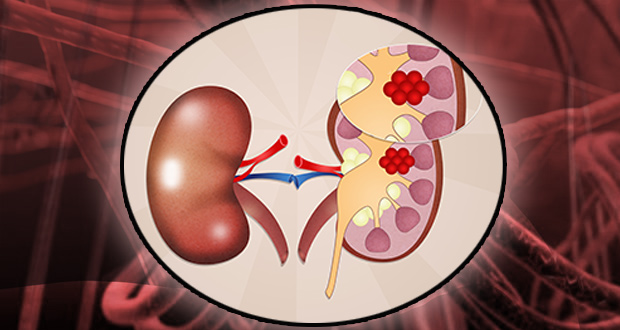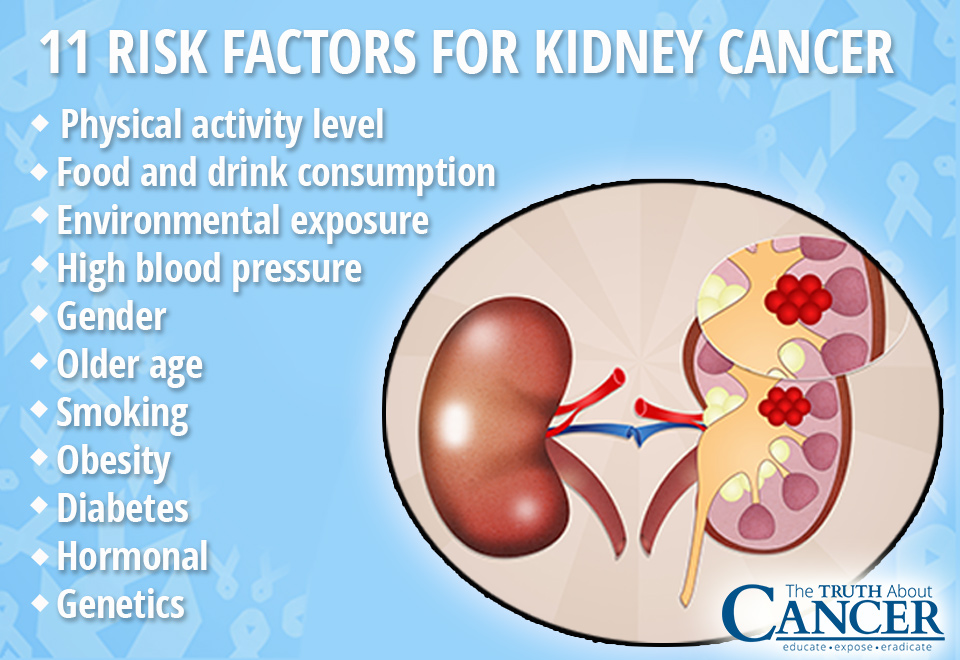March is Kidney Cancer Awareness Month. It serves as a necessary reminder to learn the warning signs of the disease as well as the primary kidney cancer causes.
Knowing the symptoms and detecting kidney cancer early can make all the difference in maximizing life expectancy.
Read on to find out if lifestyle factors are putting you or your loved ones at increased risk for this deadly cancer. Understanding the risk factors will hopefully inspire you to change your habits and reduce the likelihood of developing the disease.
Kidney Cancer Causes: Know the Facts
Every year more than 115,000 lives are claimed as a result of kidney cancer, and more than 270,000 people worldwide will hear that they have the disease. What causes kidney cancer is poorly understood amongst the medical community, and conventional treatment strategies have dismal outcomes.
However, researchers do know that kidney cancer is a metabolic disease. Genes have the potential to influence the cell’s ability to sense energy, nutrients, and oxygen, and to stimulate new pathways which progresses the disease. Roughly 5 to 8% of individuals have an inherited predisposition linked to several genes known to promote cancerous growth of the kidneys.
For patients with early stage localized cancers of the kidney, the five to ten year survival rate is about 95%. However, for patients with advanced cancer (where the tumor has spread to other organs), nearly 80% will succumb to the disease within two years.
These statistics are too threatening for anyone to ignore the warning signs.
Kidney Cancer Symptoms
The most common symptoms of kidney cancer that you should look out for include:
- Fever, unrelated to an illness such as flu
- Unexplainable and quick weight loss
- Chronic fatigue
- A lump in the abdominal region
- Persistent pain along the abdominal side
- Back pain, unrelated to an injury
- Blood in urine
Assess Your Health Risks for Kidney Cancer
Understanding your family’s health history is most important in knowing your inherited risk. Although heredity is out of your control, there are known risk factors which increase your chances of developing one of the many forms of kidney cancer.
While we cannot change the genes we have or even some of the risk factors that contribute to these cancers, we can take preventive measures to reduce the risk of developing the disease.
1. Smoking
Smoking may be one of the greatest risk factors for elevating the likelihood of developing kidney cancer. Smoking leads to a 50% increase in risk for males and a 20% higher rate in females. Carbon monoxide exposure to tissue creates a hypoxic environment, or inadequate oxygen supply.
This dilemma has cascading problems including accelerated DNA damage to white blood cells circulating in the blood and increased oxidative stress. Genetic alterations have been found in smokers, likely caused by the exposure to a major component of cigarette smoke − benzo-alpha-pyrene diol epoxide. This chemical is a well-known cause of mutations and carcinogenesis.
2. Obesity
Kidney cancer risk is significantly higher in those who are obese. The prevalence of renal cell carcinoma, in particular, has continued to grow annually and is one of the top 10 cancers affecting Americans today. More than 40% of renal cell cancer patients are obese.
Obesity increases risk of kidney cancer because it is associated with an array of adverse health complications such as insulin resistance, hypoxia, metabolic diseases, increased oxidative stress, and increased blood pressure.
Whether or not obesity alone directly impacts one’s risk factor for this cancer despite its umbrella of other factors is not known. Surely obesity correlates strong enough evidence to increase surveillance of the disease.
3. Diabetes
As with obesity, diabetes is likely a risk factor for kidney cancer despite its indirect relationship to causing the cancer.
4. Food and Drink Consumption
There are contradicting results on how food and drink consumption affects the risk for developing kidney cancer. Research has found that common substances found in fried foods and baked goods may likely elevate risk. However, contrary to popular assumptions, some evidence shows that alcohol consumption of slightly more than one alcoholic beverage daily can reduce risk by 28%.
Science provides ample support that a diet rich in vegetables and fruit will lower your risk of developing cancer. A diet rich in antioxidants is one of the best known defense systems against its occurrence.
5. Environmental Exposure
Do you clean the rugs and carpets in your home with spot cleaners and chemical solvents? You may now think twice before cleaning without the windows open and inhaling the “clean” smelling fumes.
Trichloroethylene is used for industrial machining and refrigerant purposes but can also be detected in a variety of household items such as rug cleaners. This sweet smelling chemical contaminates our air and water.
Trichloroethylene exposure can present with symptoms of nausea, dizziness, blurred vision, and confusion. Over time it can contribute to kidney cancer. While studies link several types of cancers to trichlorethylene, the relationship is consistently strongest between this toxin and kidney cancer. Scientists attribute this to specific renal cell mutations found in patients with exposure to trichlorethylene.
6. Hypertension
Hypertension, as well as the use of antihypertensive drugs and diuretics, will put you at an elevated risk. Those individuals who are both obese and hypertensive have an even higher risk level than those who have only one of these conditions.
7. Hormonal
Although the mechanisms for this association are unknown, women who give birth at a young age are 40-90% more likely to develop kidney cancer. The more births a woman had, especially at a younger age, the higher her risk.
8. Physical Activity Level
Leading a sedentary lifestyle puts you at risk for developing kidney cancer. Regular physical activity is associated with lowered body weight and blood pressure, improved insulin management, and a healthier inflammatory response.
9. Gender
You can’t change your sex or the next two risk factors but you should be well aware of your odds against the disease. Men are twice as likely to develop kidney cancer as women.
10. Age
Kidney cancer is uncommon in people under the age of 45. The average age for diagnosis is 64. People between the ages of 50-70 should be screening for symptoms of the disease.
11. Ethnic Background
Clearly genetics plays a major role in the body’s susceptibility to the disease. Numerous factors play a role in the higher cancer rates in Europe and North America as compared to occurrences in Asia and South America. However, individuals of Asian descent living in the United States exhibit the same low rates of kidney cancer as do people in their country of ancestral origin.
Article Summary
Knowing the symptoms and detecting kidney cancer early can make all the difference in maximizing life expectancy. Every year more than 115,000 lives are claimed as a result of kidney cancer, and more than 270,000 people worldwide will hear that they have the disease.
The most common symptoms of kidney cancer that you should watch for include:
- Fever, unrelated to an illness such as flu
- Unexplainable and quick weight loss
- Chronic fatigue
- A lump in the abdominal region
- Persistent pain along the abdominal side
- Back pain, unrelated to an injury
- Blood in urine
Understanding your family’s health history is most important in knowing your inherited risk. Although heredity is out of your control, there are known risk factors which increase your chances of developing one of the many forms of kidney cancer. These include:
1. Smoking
2. Obesity
3. Diabetes
4. Food and Drink Consumption
5. Environmental Exposure
6. Hypertension
7. Hormonal
8. Physical Activity Level
9. Gender
10. Age
11. Ethnic Background




















In today’s world of psychotropic and antidepressants overload, can you please do an article on the dangers these big pharma drugs do to your body. I’ve hear that years of use can damage live and kidneys to name two.
Well I am female and was 43 years old when diagnosed with Renal Cell Carcinoma (kidney cancer). On a scale of 1 to 5, 5 being the most aggressive tumor, I had a 4. I was told I wouldn’t have lived one year had I not found it when I did and had the kidney removed. I was not obese, nor diabetic, never smoked, no hypertension and no environmental factors from where I lived. So that kind of shoots down all of the above. Sometimes people get cancer for no reason. I had no symptoms related to the kidney cancer, I was sick and they did a CT scan that randomly found the tumor, unrelated to my illness. I thank God every day that it wasn’t my time to go and he helped the doctors find it in time.
Praise God they found it and you got the help you need! Those factors increase the risk factors. There are also many hidden factors that are hard to identify such as chemical toxin exposure and more. I am thanking God the doctors helped you!
So I know someone who might have cancer- they have a renal mass and do not drink, smoke, have diabetes, not over weight, very fit etc. We need to know if they go ahead with surgery, or if there is a natural way to reduce tumors?
My 70 year old mother recently was diagnosed with kidney cancer and had her right kidney removed via keyhole surgery. The operation wernt well but now she has two large blood clots in her legs and in on blood thinners, She has excess fluid in her stomach (ascites) and often vomits after taking her medication. Will this pass or is it a sign of worse to come?
Hi Lena –
Thank you for reaching out to us about this.
I’m so sorry to hear about your mother’s diagnosis – I’ll be sure to pray for her.
Unfortunately, we are unable to give any kind of medical advice. The best advice we can give you is to consult with one of the doctors we interviewed in the Global Quest series so they can give you the most appropriate advice based on your mother’s exact condition.
Please note that we are not able to select an expert for you.
We’ve created a page with the experts’ contact info as it was available to us.
Here’s the link to the actual webpage:
http://thetruthaboutcancer.com/experts-info-sheet/
We do have one more resource you may be interested in. During our Live Event 2017 series, Dr. Patrick Quillin suggested contacting The Institute of Functional Medicine to locate a practitioner in your area.
If you are interested, here is the link to search for a Functional Medicine Practitioner in your area: https://www.ifm.org/find-a-practitioner/
I’m also attaching the info about the Hope4Cancer clinic in Tijuana, MX if you’d like to reach out to them.
http://www.hope4cancer.com/
https://hope4cancer.com/schedule-a-call/
Please also see the resources below in case they will be helpful to you.
From our beginning, we have supported charities that really help these cancer patients.
HealingStrong:
http://healingstrong.com/
https://www.facebook.com/healingstrong
HealingStrong supports MANY cancer patients and are amazing. HealingStrong, a nonprofit organization, is supported 100% by volunteers, who are experienced in using natural strategies. The organization’s mission is to educate, encourage, equip, and empower those seeking comprehensive natural strategies to heal strong and stay strong.
HealingStrong Connect Groups meet monthly in various areas of the U.S. and South Australia to link others interested in natural strategies, holistic protocols, and local resources. Their groups focus on mind, body and emotional healing based on Biblical promises, as they believe the God of the Bible is our healer. For more information on how to start a group, or become involved in one, please go to http://www.healingstrong.org/groups, and like us on Facebook at http://www.facebook.com/healingstrong.
Cancer Crackdown is so awesome and helps patients without a lot of money get supplements and treatments and even helps them raise money:
http://cancercrackdown.org/
https://www.facebook.com/CancerCrackdown
Also, the Independent Cancer Research Foundation is another charity that we support, also known as Cancer Tutor. They have been a TREMENDOUS help for cancer patients and have a TON of life-saving information they give out freely and they do real research into treatments for cancer that are outside of the toxic Big Pharma Big 3:
https://thetruthaboutcancer.com/independent-cancer-research-foundation/
The best that we can suggest is to contact Healing Strong and Cancer Crackdown for any need in financial resources.
We also support Mary Beth’s “Nick Gonzalez Foundation” which is bringing Nick’s protocol to the people…which is one of the most powerful cancer-killing protocols out there.
I hope this is helpful! Please don’t hesitate to reach out to us again if there’s anything else we can help with.
Wishing you endless blessings and love!
I was diagnosed with PRCC in 2018, I am stage 4 metastatic and have had my left kidney removed. I am currently on 40 mg Cabometyx daily and it is wrecking my digestive system. I was trying to maintain a Mediterranean diet but the fresh fruits and veggies are causing me to have to take Imodium constantly. I don’t even know where to start looking for advise outside of my oncologist/hematologist, which by the way does not even believe in vitamins. I no longer have the energy to exercise or work.